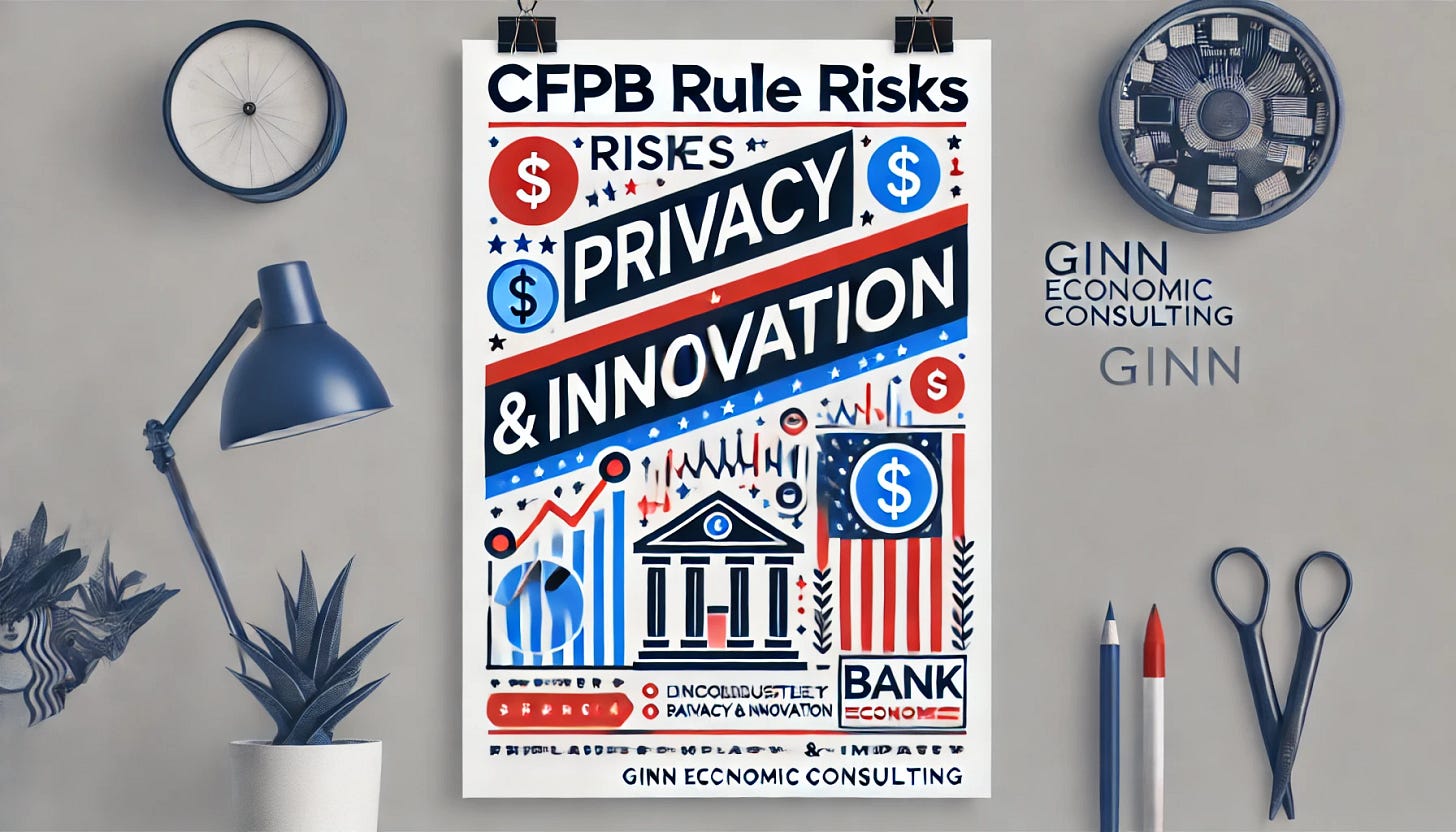CFPB’s Section 1033 Data Rule Risks Consumer Privacy and Innovation
How Government Overreach Threatens Consumer Empowerment and Innovation
Check out my latest article at X.com.
The Consumer Financial Protection Bureau (CFPB) recently finalized its Section 1033 rule, requiring financial institutions to share consumer data with third-party entities, such as fintech companies, whenever authorized by consumers. CFPB Director Rohit Chopra has framed the rule as a tool to “boost competition” and increase consumer choice. Yet, this mandate raises significant concerns about privacy, costs, and its interference with market-driven innovation. Instead of empowering consumers, the rule threatens to undermine their financial security and limit their options.
Market Solutions Already Address Consumer Needs
The financial services industry has developed secure, voluntary solutions for sharing consumer data. Banks and fintech companies have created Application Programming Interfaces (APIs) that allow consumers to share their financial data safely and on their terms. These innovations were driven by competition and consumer demand, not government mandates.
However, the CFPB’s Section 1033 rule disrupts this progress by forcing banks and fintechs to comply with a one-size-fits-all approach. The Bureau’s regulatory intervention is unnecessary and risks diverting resources from innovation. As the Bank Policy Institute aptly noted, the rule appears to be a "solution in search of a problem," addressing an issue already resolved by the private market.
Privacy Risks and the Burden on Consumers
The CFPB’s rule mandates that financial institutions share sensitive consumer data—such as transaction histories and account balances—with third-party entities. Yet, it fails to impose strong and uniform security standards for data protection. Once a consumer authorizes the release of their information, the bank relinquishes its ability to safeguard that data.
By shifting the burden of security onto consumers, the CFPB increases the likelihood of data breaches and misuse. In its push to expand data access, the Bureau has overlooked the importance of protecting consumers' privacy. As Forbes highlighted, the rule introduces privacy risks that could erode trust in the financial system—a trust built through years of market-driven improvements.
Increased Costs and Reduced Competition
The compliance costs associated with Section 1033 will disproportionately affect smaller financial institutions, which are less equipped to absorb these expenses. Larger banks and fintech may gain a competitive advantage, as they can more easily manage the regulatory burden. However, this unintended consequence could stifle competition, harming the consumers the rule purports to help.
Consumers will also bear these costs through higher fees or reduced service quality. Instead of fostering innovation and lowering costs, the CFPB’s rule forces institutions to redirect resources from developing better products to meeting regulatory requirements.
Legal and Legislative Pushback
The Section 1033 rule has already sparked legal challenges. When the rule was finalized, several trade associations filed lawsuits questioning the CFPB’s authority to impose such sweeping mandates. These legal battles reflect widespread concerns about the Bureau’s overreach and the potential for regulatory overkill.
The CFPB’s funding structure is adding to the controversy, which bypasses congressional oversight by drawing its budget directly from the Federal Reserve. This setup enables the Bureau to act with little accountability, raising broader concerns about its governance and the appropriateness of its regulatory agenda.
A Free-Market Alternative
Consumer empowerment does not require government mandates. The financial services sector has proven capable of addressing consumer demands for data portability through voluntary, competitive solutions. The best path forward is a dynamic market driven by consumer choice, not regulatory coercion.
History shows that innovation flourishes in environments free from unnecessary government intervention. Allowing banks and fintechs to compete on security, efficiency, and user experience will better serve consumers than top-down mandates prioritizing regulation over real progress.
Conclusion
While the CFPB’s Section 1033 rule is marketed as a tool to increase competition and consumer choice, it risks leaving consumers with fewer protections, higher costs, and reduced privacy. Real consumer empowerment comes from the competitive forces of the free market; not government mandates that disrupt innovation and impose unnecessary burdens on the financial sector. Congress and the courts should resist this overreach, ensuring that consumers can benefit from a financial system guided by market principles rather than bureaucratic directives.
Sources
CFPB Finalizes Personal Financial Data Rights Rule
https://www.consumerfinance.gov/about-us/newsroom/cfpb-finalizes-personal-financial-data-rights-rule-to-boost-competition-protect-privacy-and-give-families-more-choice-in-financial-services/Trade Associations Sue CFPB on Same Day as Final Section 1033 Rule
https://www.consumerfinancemonitor.com/2024/10/24/trade-associations-sue-cfpb-on-same-day-as-it-issues-final-open-banking-rule-under-section-1033-of-dodd-frank/CFPB Issues Final Section 1033 Open Banking Rule; Legal Challenge Filed Immediately
https://www.consumerfinancialserviceslawmonitor.com/2024/10/cfpb-issues-final-section-1033-open-banking-rule-legal-challenge-filed-immediately/The Problems with the CFPB’s New Open Banking Rule
https://www.forbes.com/sites/ronshevlin/2024/11/24/the-problems-with-the-cfpbs-new-open-banking-rule/The CFPB’s Open Banking Rule Is a Solution in Search of a Problem
https://bpi.com/american-banker-the-cfpbs-open-banking-rule-is-a-solution-in-search-of-a-problem/

